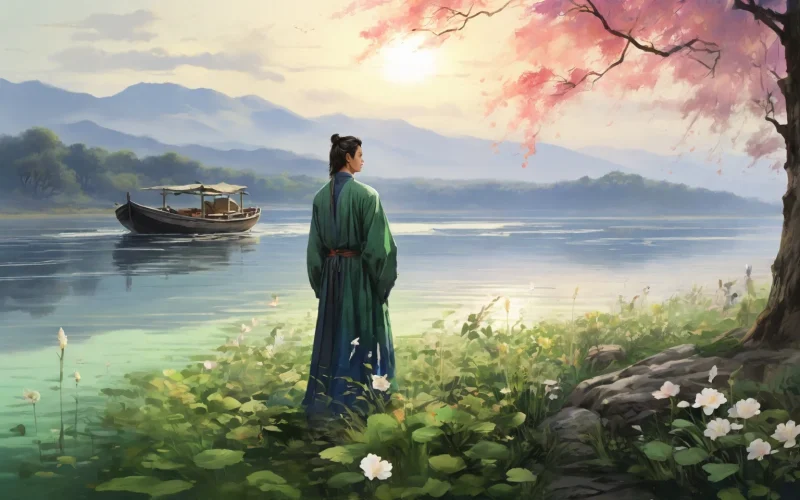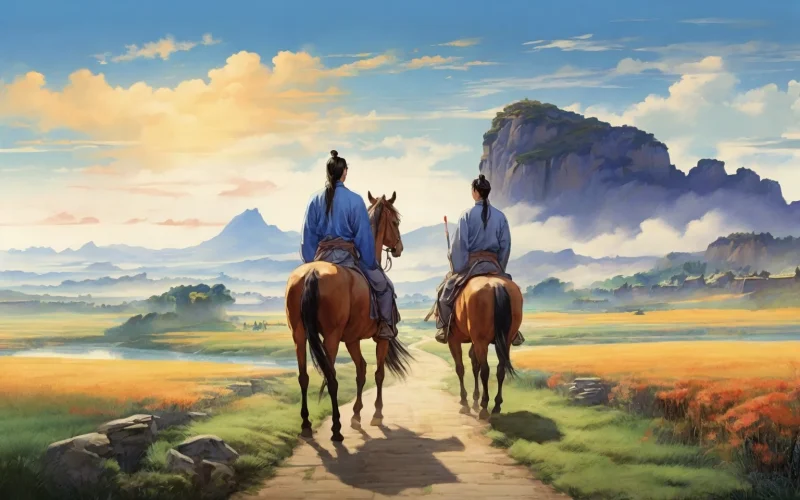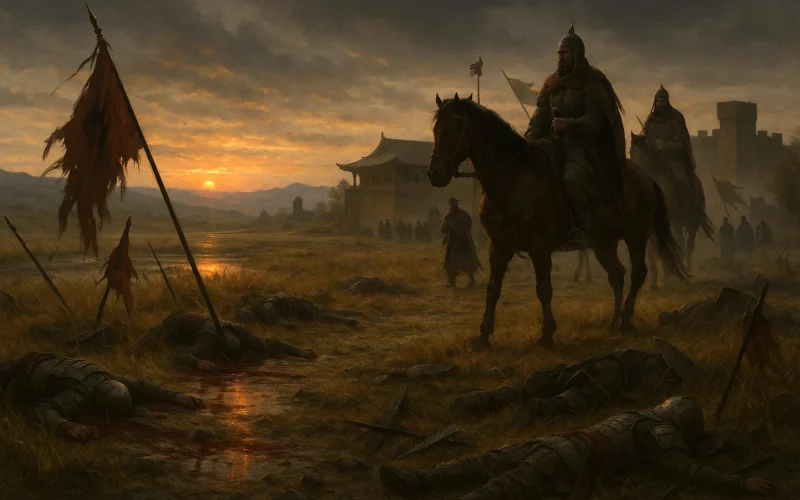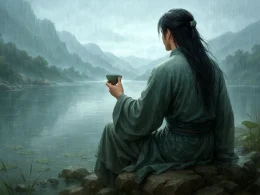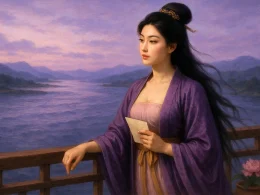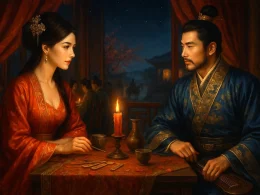In vernal breeze outside town walls we stop our oar;
The cloudy weather turns fine on chilly river shore.
Our gowns are wet with drizzling rain although unseen;
The flowers fall at leisure unheard by ears keen.
Your lonely sail sets off at sunset on the stream;
The grass will green for miles the southern shore in dream.
If you meet with some friends who inquire after me,
Tell them the blue-gowned petty official's carefree.
Original Poem:
「送严士元」
刘长卿
春风倚棹阖闾城,水国春寒阴复晴。
细雨湿衣看不见,闲花落地听无声。
日斜江上孤帆影,草绿湖南万里情。
东道若逢相识问,青袍今已误儒生。
Interpretation:
The exact time and background of this poem's creation are difficult to ascertain, but some details allow us to speculate about its period and inspiration. From the line "春风倚棹阖闾城" (Spring breeze leaning on the oar at He Lu city), it can be inferred that this poem was likely written in what is now Suzhou. The entire poem features concise and exquisite language, with delicate and vivid depictions of scenery, filled with a sense of flowing atmosphere.
First Couplet:
"春风倚棹阖闾城,水国春寒阴复晴。"
(The spring breeze leans on the oar at He Lu city; the spring chill of the water country alternates between overcast and sunny.)
This couplet uses the depiction of natural scenery to reflect the poet's inner hesitation and uncertainty. The unstable spring weather in He Lu city (modern-day Suzhou) symbolizes the poet's confusion and complex emotions about the future.
Second Couplet:
"细雨湿衣看不见,闲花落地听无声。"
(The fine rain wets my clothes, but I cannot see the raindrops; idle flowers fall silently to the ground.)
This couplet demonstrates the poet's meticulous observation of the surroundings. The fine rain falls quietly, and the petals fall to the ground without a sound, creating a tranquil yet slightly sorrowful atmosphere.
Third Couplet:
"日斜江上孤帆影,草绿湖南万里情。"
(The setting sun casts the shadow of a lone sail on the river; the lush green of Hunan evokes feelings across ten thousand miles.)
These lines depict the poet's view of the distant future, drawing a picture of his lonely state of mind and deep feelings of nostalgia for friends.
Fourth Couplet:
"东道若逢相识问,青袍今已误儒生。"
(If I encounter an acquaintance on the road, tell them that I, wearing a blue robe, have become a disappointed scholar.)
This line expresses the poet's helplessness and frustration over his unsuccessful career. The blue robe symbolizes a low official position, and "误儒生" (a mistaken scholar) reflects the regret of not achieving his aspirations.
Overall Appreciation
The entire poem flows smoothly, with harmonious tones and delicate, meaningful depictions of nature. The poet uses the changing weather of the water town as a prelude to express his inner fluctuations and uncertainty about the future. The fine rain and falling flowers symbolize the poet's loneliness and sorrow. The poet’s keen observation of nature intertwines with the emotional expression, revealing his profound inner world.
Inspiration
This poem not only depicts natural scenery but also reflects the poet's complex emotions. Through meticulous descriptions of nature, it skillfully combines personal feelings with the landscape, creating a strong emotional resonance with the reader. Even in the face of disappointment and separation, the poet finds comfort and a way to express his emotions through small details. This artistic technique is worth learning.
Poem translator:
Xu Yuan-chong (许渊冲)
About the poet
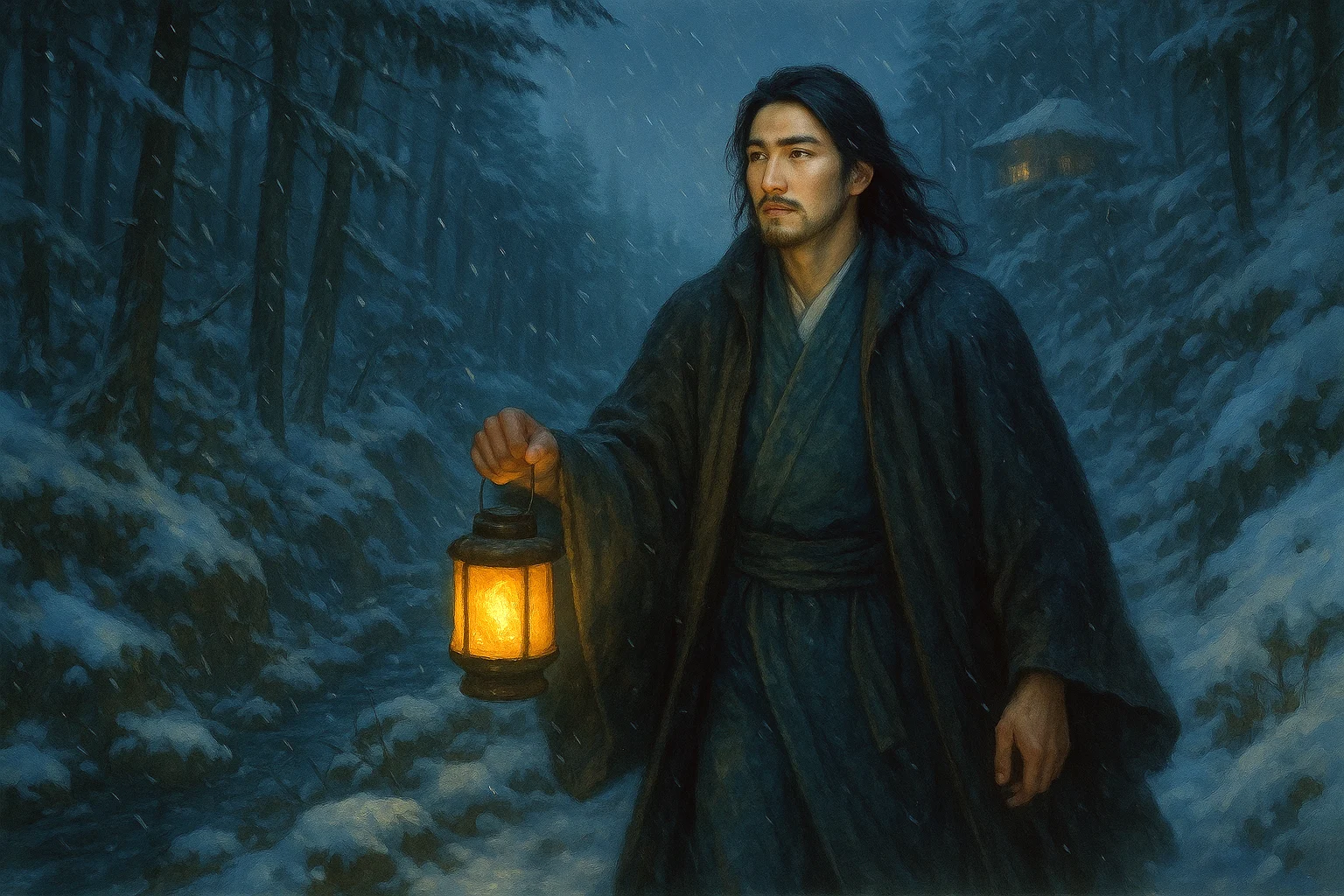
Liu Zhangqing (刘长卿) was a native of Xian County, Hebei Province. He studied at Mt. Songshan when he was young, and later moved to Jiangxi, where he received his bachelor's degree in 733 A.D. He also belonged to the Wang and Meng school of poetry. His poems belonged to the school of Wang and Meng, and he was most famous for his five-character poems, and was also most conceited, once thinking that he was "the Great Wall of five-character poems", which meant that no one could surpass him.






